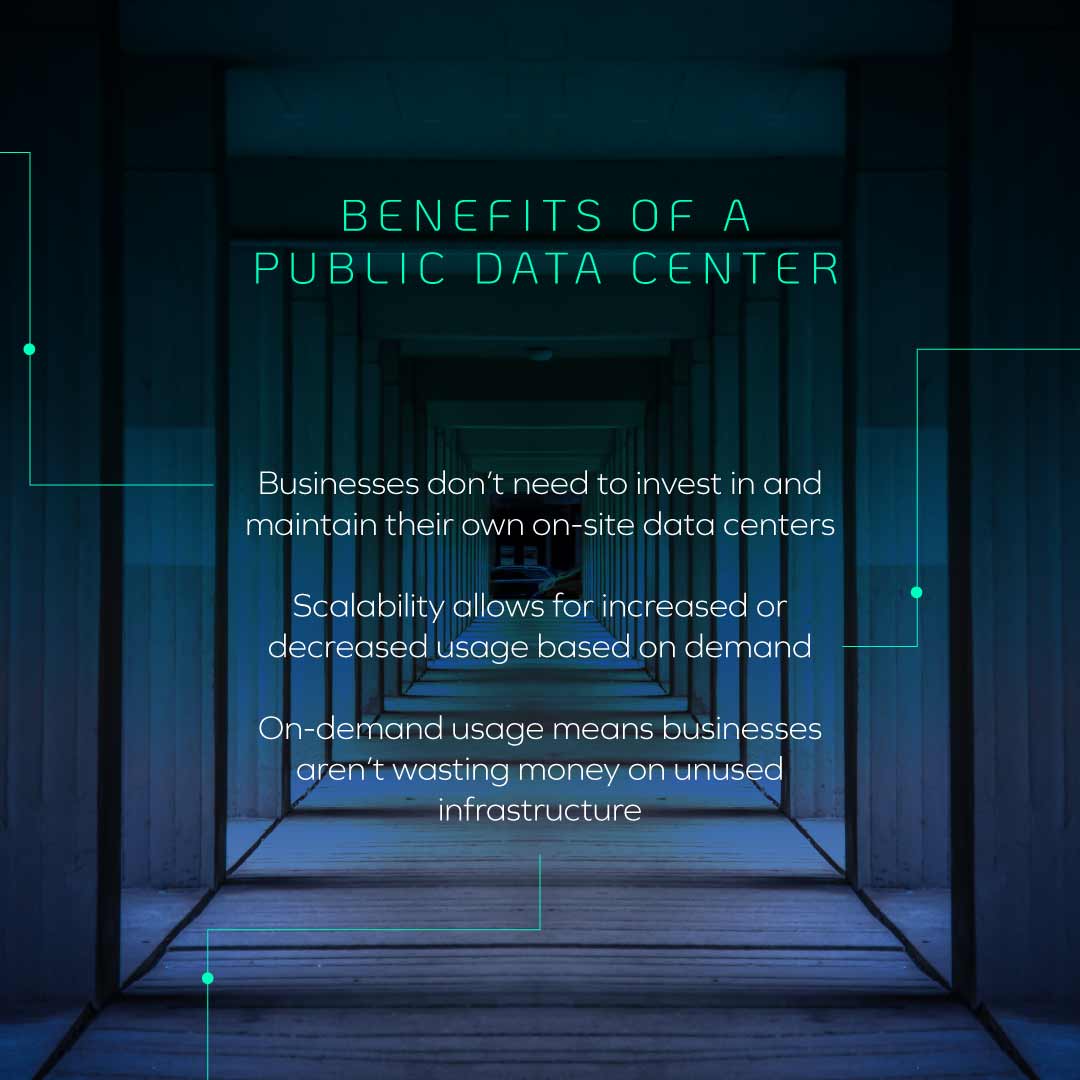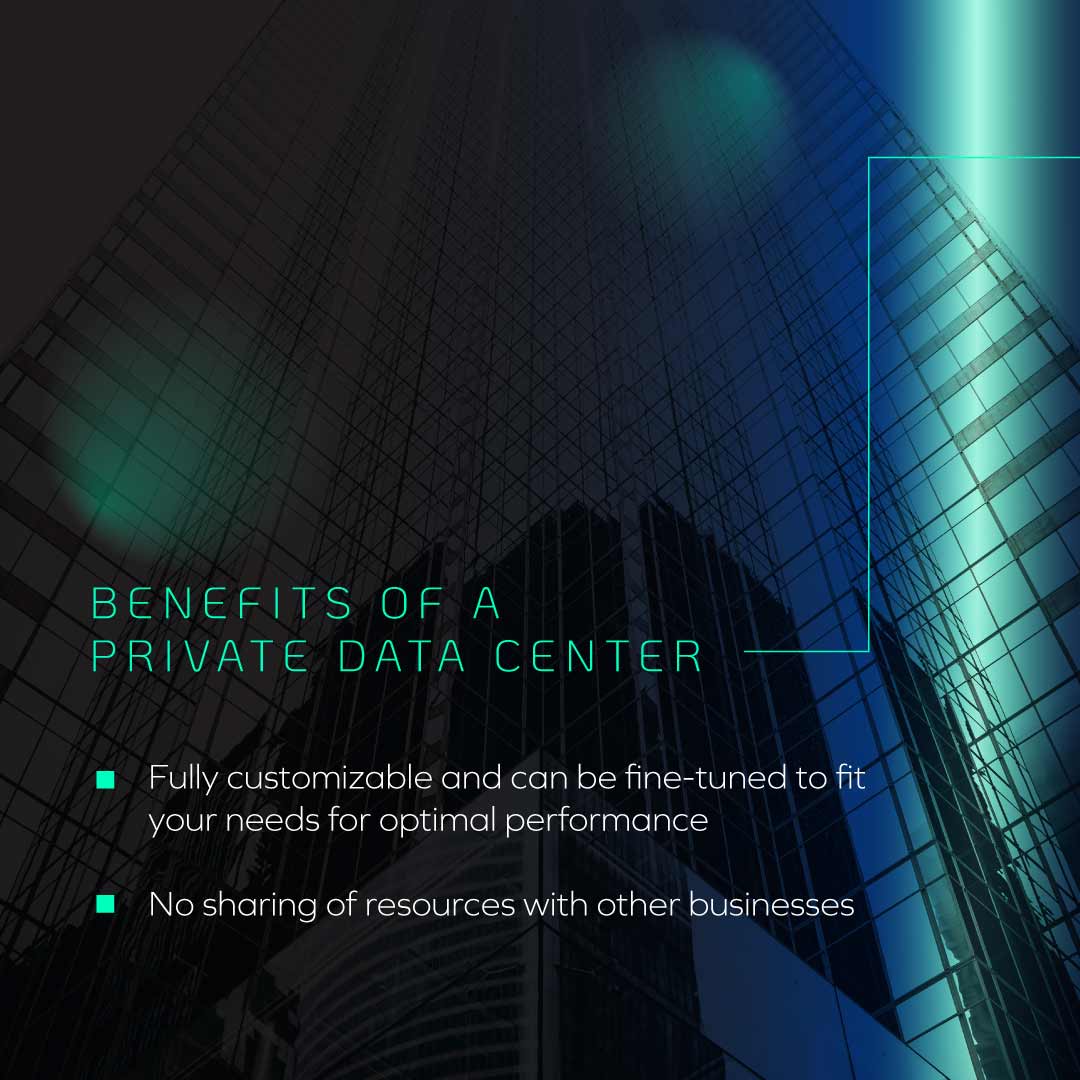Compliance Services
Private vs Public: Which Data Center Options Are Best for Your Data?
October 04, 2021
3 minutes

When migrating more of your business' information to the cloud, business leaders must ask themselves many different questions about what information should be migrated and where they want to store it.
Part of that discussion is deciding whether to use a public or private data center and what the pros and cons of each might be for a business.
What Are Your Data Center Options?
When choosing a data center for your information, you have a few options that each provide their own sets of pros and cons.
Public Data Centers
Public cloud storage is offered as a third-party data center, meaning that it’s owned by an additional company who operates and maintains the facility and equipment.
It’s called a public data center because its servers are shared by other customers, though your data is stored separately from others.
One pro of a public data center is that they’re very scalable and are an affordable option for most businesses. Many features will be available at a per-user rate and through a subscription.
Sign up for our newsletter!
Many cloud applications such as Microsoft 365 and Google Suite are used in conjunction with public data centers.

Security at Public Data Centers
Thanks to improved security over the last few years, public data centers have become a reliable, safe place which organizations can feel comfortable using to store sensitive information.
To help businesses make informed decisions on where their data is going, a system of tiers has been established which rates data centers by their equipment and how much downtime they experience each year.
Most reputable providers will be able to offer Tier III or Tier IV data center options.
Tier III and IV data centers experience very little downtime and are fully redundant which protects your business from unexpected outages.
Private Data Centers
A private cloud is very similar to its public counterpart, the only difference being that it isn’t offered to the public and other companies.
The only person who has access to it is you and you server space for storage is not shared between users as with public cloud options.
When you use a private data center you know with certainty that its resources and technology will never be used to service other customers.
Private data centers also allow you much more control over its capabilities and maintenance, which may be important for businesses in highly regulated trades.

Security and Compliance for Private Data Centers
For some businesses, the extra control and peace of mind that comes with a private data center is enough to warrant the expenditure.
But, for others, a private data center is a must, especially for businesses who work in industries where they will be storing sensitive data from their customers, such as healthcare providers and law firms.
For these businesses, private data centers help protect their private data by giving them more control over who has access and how the information is protected.
Additionally, new compliance laws like GDPR and CCPA must be abided by, and the extra control gives companies who must adhere to these regulations the ability to ensure that they are compliant.
With consumers paying more and more attention to who has their data, it’s likely that even more privacy laws will be created in the near future.
Hybrid Data Centers
For those caught in between, the hybrid data center option is when a business utilizes both private and public data centers.
Those who choose a hybrid data center option have a private data center used to host critical business apps and data while utilizing a public data center for basic tasks and less sensitive data and information.
This is a good option for businesses who need scalability found in the public data centers but who want the control of a private cloud, also.
This allows you to pick and choose what is and isn’t stored on the public server with the added ability of freeing up space in your private data center if the need arises.
The hybrid approach is very appealing to SMBs because it offers most of the advantages of each side—the customized aspect of private data centers and the affordability of public data centers.
Which Data Center Options Are Right for You?
Public data centers offer most of the core capabilities and security options that a business will need. So, the real question a business should ask is: Do I need a private data center as part of my infrastructure?
Of course, there are instances where having access to a private data center—whether as part of a hybrid system or standalone—is worth the investment, including:
- If you need to ensure regulatory compliance
- If you have need tech infrastructure but have little fluctuation
- If you need flexibility and control in order to manage and allocate your data center’s resources
Each data center solution has its pros and cons and deciding which one is right for your business depends on many factors unique to you.
Choosing between a public and private data center is just one major decision businesses must make when assessing and improving their cybersecurity efforts. If you’re unaware of what you need or how to make these decisions, speak to an expert at DOT Security today.
